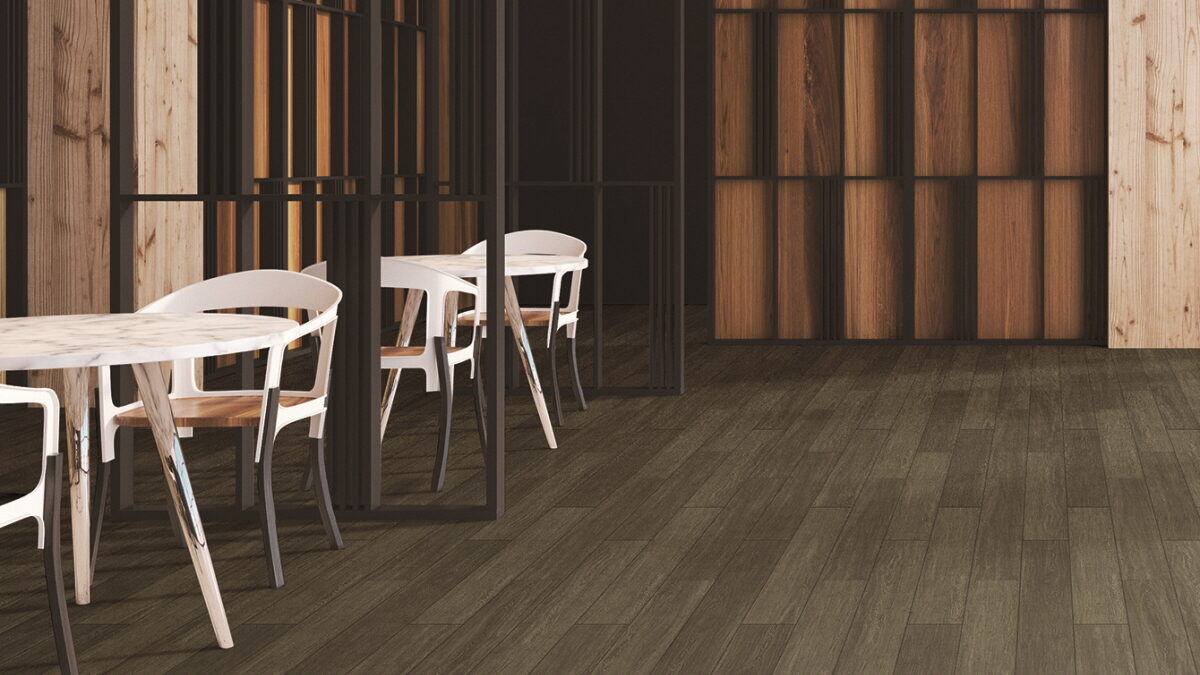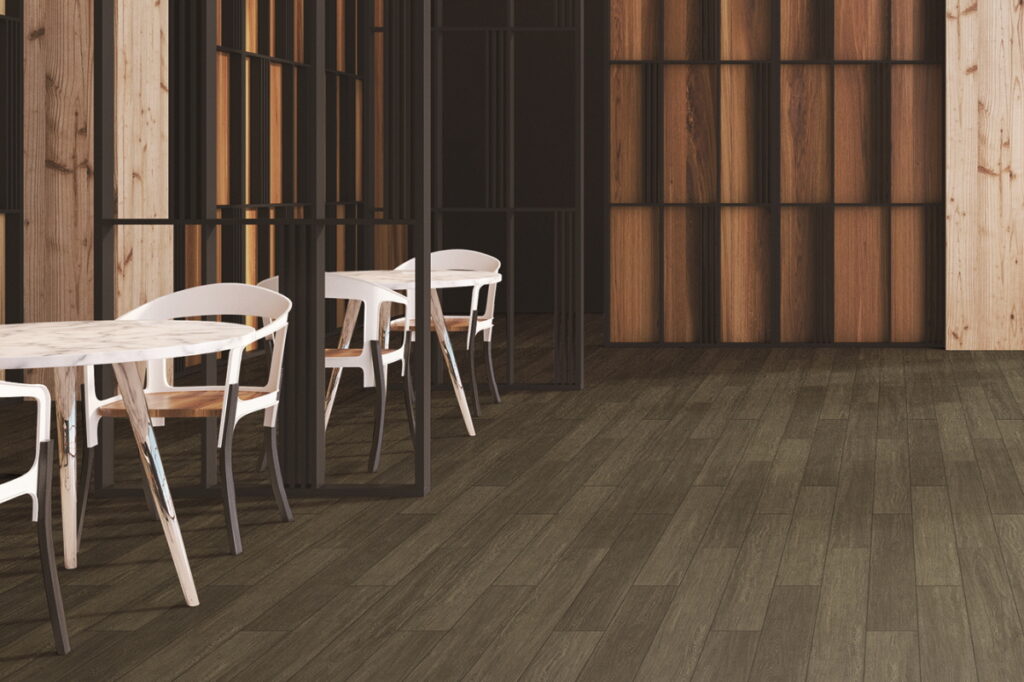
As a restaurant owner or operator, choosing the right flooring for your establishment is a critical decision that can impact the safety and comfort of your customers and employees as well as your operational efficiency. It’s essential to consider factors such as safety, slip resistance, durability, ease of maintenance, and aesthetics when selecting restaurant flooring. In this article, we’ll explore some of the key considerations you should keep in mind when choosing flooring for your restaurant, with a focus on safety, slip resistance, and sanitation. Understanding these factors and making an informed decision can create a welcoming, comfortable, and safe environment for your guests and employees.
Factors to consider for restaurant floors
There are numerous factors to consider before you decide on your restaurant flooring. Some of the most important factors to consider are where you’ll use the flooring, the amount of traffic it will receive, and the types of activities it will support. The flooring you choose for your back-of-house operations and kitchen may differ from what you choose for your dining room. Still safety, sanitation, and slip resistance will be critical factors in all restaurant flooring decisions.
Safety
Safety is a top priority when choosing flooring for your restaurant, as slips and falls can lead to injuries and potential liabilities. Restaurant flooring must be safe for employees and customers, reducing slips, falls, and tripping. Water, grease, and high traffic can be a recipe for disaster, but the proper flooring material can help minimize the risks.
Sanitation
Keeping your floors clean and sanitary can reduce injuries and even food-borne illnesses, so it’s essential to find a flooring material that’s easy to clean. You’ll also want to look at floors that can be sanitized easily without harsh chemicals, which can negatively affect those with respiratory issues, and without the use of specialized equipment that can increase maintenance costs.
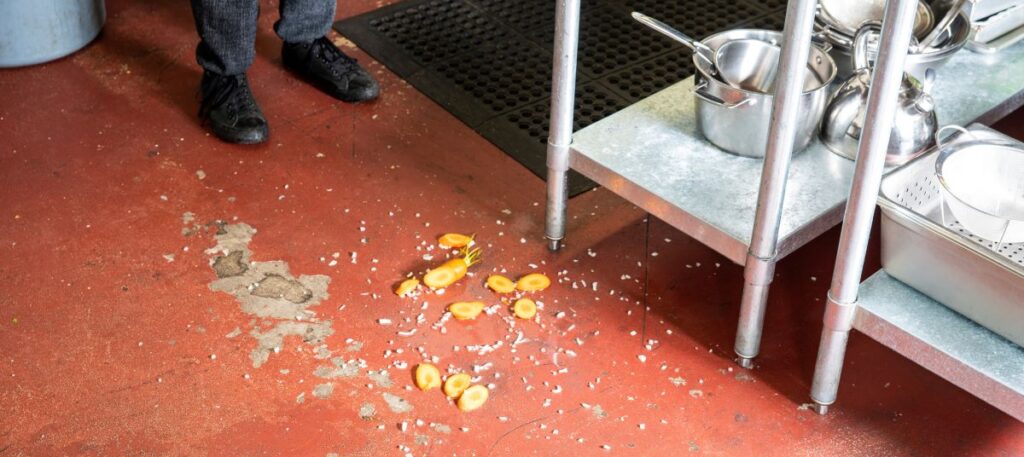
Slip Resistance
The chances of encountering a slippery floor are much higher in restaurants and foodservice environments where drinks can spill, food debris can fall, and floors can become greasy or wet. A little traction goes a long way in preventing slips and falls, so you’ll want to evaluate your flooring based on its slip resistance to ensure you keep your customers and employees safe.
Commercial Restaurant Kitchen Flooring
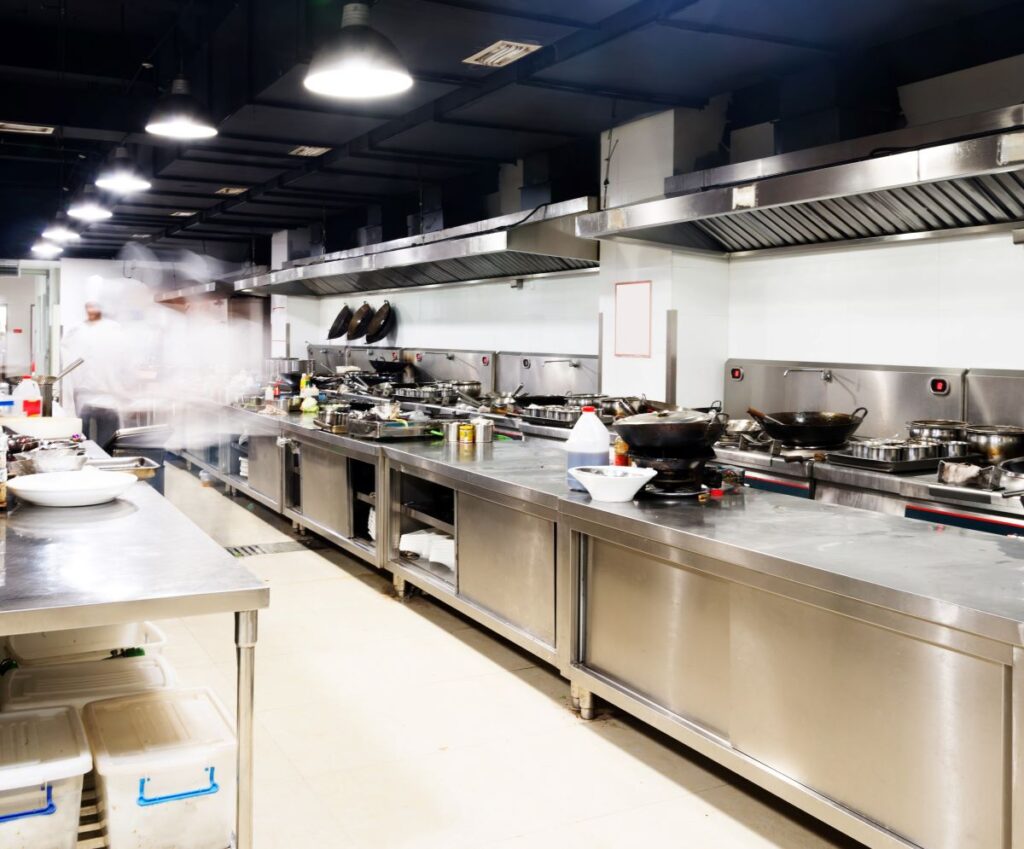
Many flooring materials are available for kitchens, but what works for a residential kitchen may not perform in a busy, high-volume commercial environment. The materials you use in your kitchen must be durable, hygienic, slip-resistant, and easy to clean. Features such as affordability, easy installation, comfort, heat resistance, and noise insulation can enhance functionality and help reduce operational expenses. Let’s look at four of the most common flooring materials for commercial kitchens and weigh the pros and cons of each.
Vinyl Flooring
Vinyl flooring, also known as resilient flooring, comes in three formats, sheet vinyl, tile, and plank. There are also two classifications for vinyl flooring — standard and luxury vinyl plank. Luxury vinyl is thicker, more durable, and the better option for commercial application. Plank vinyl, known as luxury vinyl plank (LVP), often mimics wood flooring, while luxury vinyl tile (LVT) resembles natural stone tile. Sheet vinyl comes in rolls and reduces the number of seams, which reduces contaminants or debris from collecting in the cracks between flooring. There are several benefits, and a few drawbacks to using vinyl in a commercial kitchen, including:
Pros
- Comfortable
- Affordable
- Easy to clean
- Easy to install
- Water, stain & chemical resistant
- Pre-treated anti-slip and anti-skid options available from some manufactures
- Quiet and more noise-absorbing than harder materials
- Numerous colors and design options
Cons
- Can be difficult to determine quality and performance properties
- Can be damaged by high heat and sharp objects
- Not environmentally friendly
Porcelain Tile
Porcelain is a type of ceramic that uses higher heating temperatures and finer clay particles to produce a flooring tile or slab that’s exceptionally durable and heat resistant. Porcelain tiles have a water absorption rate of .5%, making them an excellent choice for kitchens focused on food preparation. Porcelain comes in various finishes, including matte, satin, and high-gloss polish. You can also find porcelain without finish, which may help with traction and slip resistance.
Pros
- Extremely durable
- Heat resistant
- Low maintenance, easy to clean
- Water-resistant
- Slip-resistant, especially if left unfinished
- Available in many colors, styles, and sizes
- May be available with UV resistance for outdoor kitchens
Cons
- Hard surface that may crack or chip if heavy objects are dropped on it
- Will shatter plates and glassware dropped on the flooring
- Uncomfortable to stand on
- Difficult to install
- Expensive
- Grout lines can be difficult to clean and may require frequent maintenance
Ceramic Tile Flooring
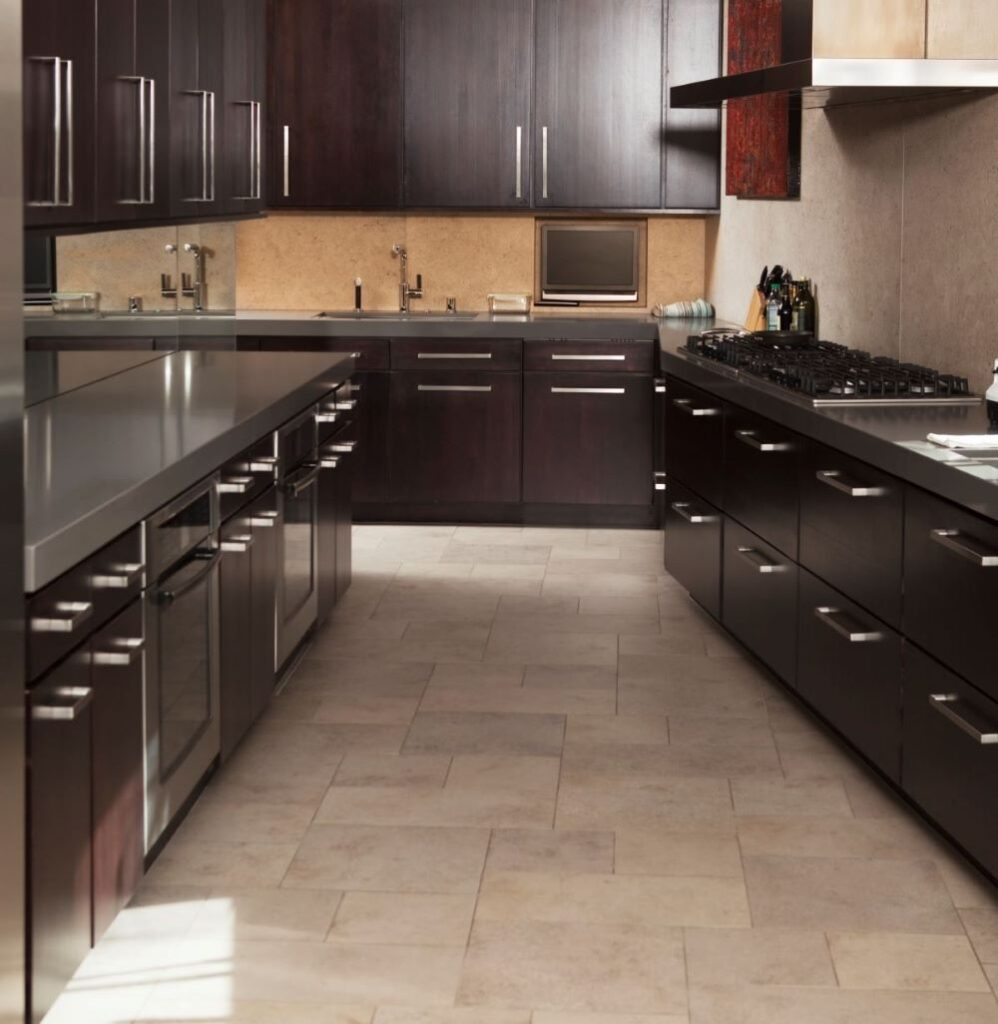
Like porcelain, ceramic tile consists of clay and mineral particles fired at high temperatures to create durable, heat-resistant, easy-to-clean flooring. Ceramic tile flooring is a popular choice for restaurant kitchens, with its pros and cons. It is also available in various finishes, which can help it resist stains. Unfinished ceramic offers more traction and better slip resistance but less moisture and stain resistance.
Pros
- Durable and long-lasting
- High heat resistance
- Easy to clean
- Available in many colors, styles, and sizes
- Lower cost than porcelain
- Unfinished tiles offer slip resistance
Cons
- Hard surface that may crack or chip if heavy objects are dropped on it
- Will shatter plates and glassware dropped on the flooring
- Uncomfortable to stand on
- Difficult to install
- Expensive
- Grout lines can be difficult to clean and may require frequent maintenance
Epoxy Flooring
So far, we’ve discussed flooring covering materials, but there’s another option you may want to consider — epoxy coating. Epoxy floor coatings consist of a resin and a hardener mixed together and applied to concrete to create a seamless flooring surface. Epoxy floors are durable and resist damage from physical wear and chemicals; however, they aren’t indestructible. It’s common for epoxy floors to chip or crack if not installed correctly. Grease and high heat may also damage the coating, leaving small pits in areas around frying stations. While epoxy can be extremely slippery when wet, a grit additive can be added to the top coat to make the floor less dangerous.
Pros
- Seamless
- Easy to clean
- Durable
- Chemical and stain resistant
- Can handle a lot of weight and foot traffic
- Less expensive than porcelain and ceramic
- Can be customized with any color and many designs
- Top coat can be mixed with grit for better traction
Cons
- May need replacing in 2-3 years
- Uncomfortable
- Takes days to install & requires proper ventilation
- Can peel or crack if not installed properly
- Slippery if not mixed with some form of grit
- May pit or damage if exposed to high heat, grease. and oils
Flooring for Restaurant Dining Rooms
Selecting flooring for a restaurant dining room requires the same attention to detail. As we mentioned, you’ll want the flooring to be safe, slip-resistant, and durable enough to handle high foot traffic. You’ll also want it to be easy to clean and affordable enough to meet your budget. However, unlike the kitchen, style, color, and overall appearance may hold more weight in this highly visible area. Let’s take a look at some of the more popular options.
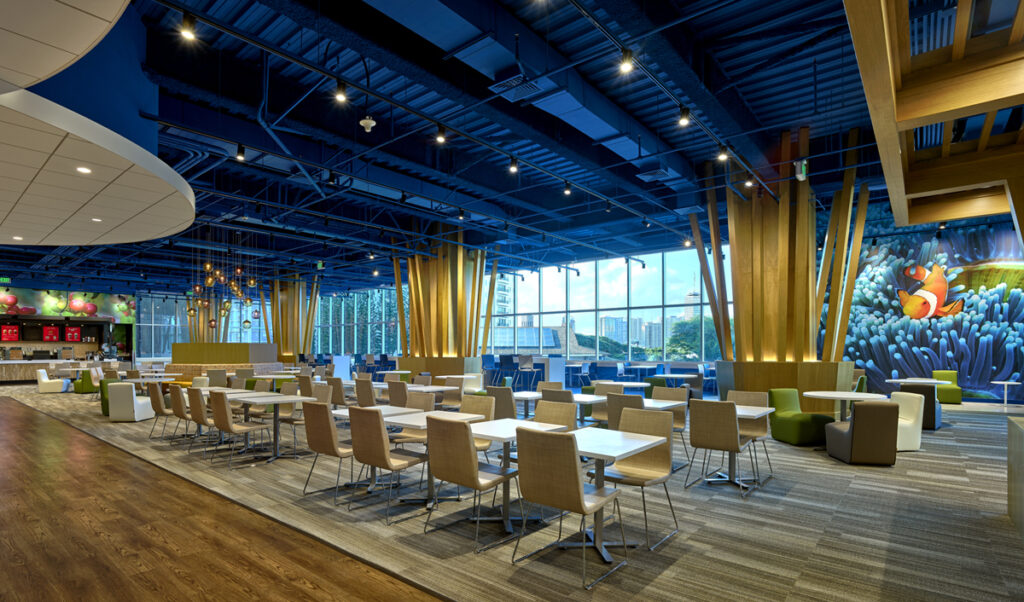
Vinyl Flooring – LVT/LVP
Luxury vinyl plank (LVP) and luxury vinyl tile (LVT) flooring are affordable options for adding high-end style to your restaurant. LVP provides the look of natural wood flooring, and LVT mimics natural stone at a more affordable price. LVT and LVP are easier to clean and maintain than natural hardwood and stone flooring. To increase durability, look for vinyl flooring with a thick wear layer and a rigid core, preferably a stone polymer core (SPC).
Pros
- Numerous colors and patterns to enhance your interior design
- Affordable
- Easy to Install
- Moisture and stain resistant
- Durable and long-lasting
- Easy to clean
Cons
- May scratch or scuff with heavy objects and moving furniture
- Not heat resistant
- May fade in direct sunlight
- Difficult to repair
Laminate
Laminate has come a long way since the middle of the last century when it was a staple in many homes. Manufacturing advances have improved the look and functionality of this affordable flooring. However, quality can be inconsistent, and budget brand laminate can look cheap and damage easily. It’s best to go with a reputable, name-brand manufacturer if you decide on laminate for your restaurant.
Pros
- Affordable
- Stain resistant
- Easy to clean
- Withstands heavy foot traffic
- Scratch resistant
- Available in numerous colors and designs
Cons
- Low-quality laminate can look cheap
- Can warp or swell with significant water absorption
- Noisy
- Slippery
Carpet Tile
Carpet tile remains an extremely popular flooring choice for bars and restaurants, creating a warm and inviting design. However, as with any flooring option, there are pros and cons to this type of flooring.
Pros
- Slip resistance
- Warm and comfortable
- Easy to install and remove
- Durable
- Noise-reducing
- Available in numerous colors and designs
- Affordable
Cons
- Difficult to keep clean
- Not as stain resistant
- Can attract dust, crumbs, and allergens
- High maintenance
Natural Stone Tile
Natural stone is renowned for its beauty and luxurious appearance, but the aesthetics come at a price. One of the most expensive flooring types, marble may look good and last a lifetime, but it has a few drawbacks.
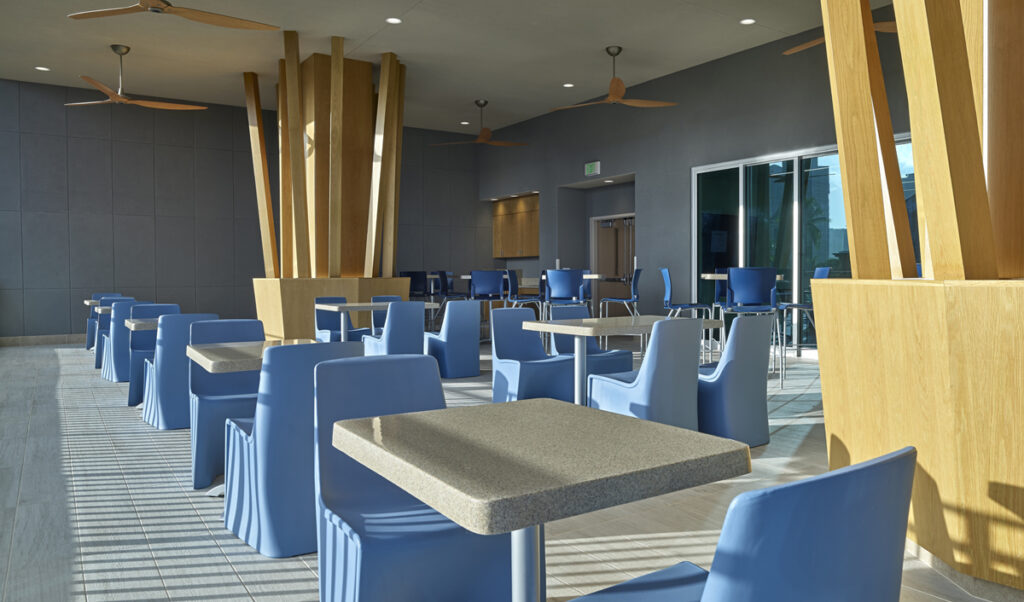
Pros
- Luxurious, high-end appearance
- Easy to clean
- Will last a lifetime
Cons
- Expensive
- Susceptible to water and moisture damage
- Not scratch or stain resistant
- Cold
- Hard and uncomfortable
- May increase the severity of injuries from falls
- Porous
Contact Us
Let’s talk about your next project. If you need help finding flooring for a restaurant project, contact us today, and one of our helpful professionals will be in touch soon.

